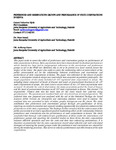PREFERENCES AND RESERVATIONS GROUPS AND PERFORMANCE OF STATE CORPORATIONS IN KENYA

View/
Date
2021-06Author
Njoki, Gatari Catherine
Ismail, Noor
Osoro, Anthony
Metadata
Show full item recordAbstract
This paper seeks to assess the effect of preferences and reservations groups on performance of state corporations in Kenya. State corporations have been characterized by declined performance which mainly has been tied to inappropriate adherence to the reservations and preferences groups as set in the PPAD Act. However, this is yet to be proved in a local context, hence the subject of the study. The paper also seeks to assess the moderating effect of enforcement of the public procurement act on the relationship between preferences and reservations and performance of state corporations in Kenya. The paper was informed by the theory of public value. A descriptive research design was used which was anchored on positivist philosophy. The target population of this study included all 187 registered state corporations in Kenya. The sampling frame comprised of heads of finance and heads of procurement function in all 187 state Corporations in Kenya. The study used a census where all the 187 state corporations were surveyed. To identify the unit of observation, the study purposively picked the head of finance and the head of procurement function in all 187 state corporations in Kenya. This formed 374 respondents. Primary data was the main data for the study which was collected using questionnaires. The questionnaire involved both semi structured and structured questions. The collected data was prepared and analyzed with the aid of the Statistical Package for Social Sciences (SPSS) Version 26. Descriptive and inferential statistics were used to analyse. The analyzed data was presented in form of tables, graphs, histograms and Pie charts. The study established that preferences and reservations groups through pre-qualification of firms, reporting on contracts awarded and capacity building significantly and positively influenced the performance of the state corporations. The findings further revealed that the enforcement of the public procurement act had a significant positive moderating effect on the relationship between preferences and reservations and the performance of state corporations in Kenya. The study concluded that through well-embraced pre-qualification of firms under the reservations and preferences groups and reporting the awarded tenders to these firms, the state corporations enhance effective operation and save the costs and time thus enhancing performance. It is therefore recommended that the state corporations should adopt effective and well-articulated strategies of ensuring the special groups under the preferences and reservations are catered for during the tendering processes. This serves to enhance performance and effectiveness of the state corporations.
